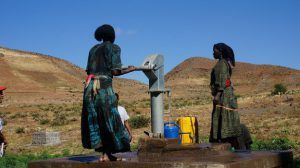
Note: This course is also offered as part of the Professional Development Diploma on Sustainable Development and Human Rights.
Course Description
This six week specialized online course introduces participants to the gender dimensions of the interface between development and human rights. Social constructions shape our identity, and thus, have critical impact on our daily lives. Diverse gender identities and concepts are taught in formal and informal educational institutions and determine our past, present and future, and may lead to inequality. Gender inequality and inequity then, may lead to human (and women’s) rights violations. This course will give an introduction to the solutions suggested by Gender Mainstreaming to gender inequality in human rights and development work based on the analysis of social constructions and through gender sensitive educational tools. By means of e-conversations and dialogue, the training will combine academic theory with participants’ lived and work experiences. The course will provide participants with the skills to conduct gender analysis in order to ensure gender mainstreaming in human rights and development work. It will also explore mechanisms for human rights sensitive development intervention with a strong focus on gender equality. Finally, the course will explore the intersections between human rights and gender through an analysis of contemporary issues such as gender based violence, trafficking, sex work, contemporary slavery etc, which impede the quest for sustainable development.
The course is based on a dynamic pedagogy including reading materials, video clips, case studies, and interactive webinars with the instructor.
Course outline
- Week 1: Gender Analysis
- Week 2: Gender Mainstreaming in Human Rights, Peace, and Development Work
- Week 3: Education for Gendered Human Rights and Development
- Week 4: Human Rights Sensitive Development Intervention
- Week 5: Social Rights, Political Rights, and Gender
- Week 6: Human Rights, Development, and Questions of Contemporary Slavery, Trafficking, and Sex Work
Who Should Apply
The course is intended for staff members of civil society organisations and (inter)governmental organisations involved in the fields of gender equality, women’s rights, LGBTQI rights, development work, human rights, education, health etc. Candidates should have a good written command of English and have high competence and comfort with computer and Internet use.
About the Instructor
Gal Harmat (Israel) is an Assistant Professor in the Gender and Peace Building Masters Programme at UPEACE. Dr. Gal Harmat holds a PhD in Gender Analysis of Peace Education and Dialogue encounters from Nitra University (Slovakia) and a M.A. in Gender and Peacebuilding from the UN-Mandated University for Peace in Costa Rica. She was a professor in conflict transformation, peace education and gender and Co-Director of the Social Justice and Peace Education Teachers Training Program, Kibbutzim Teachers College in Tel Aviv, Israel. He has also been teaching in the World Peace Academy (University of Basel), the European Peace University (Austria), and the Arts and Social Change College in Israel. As a Gender and Peacebuilding Specialist, she has extensive experience in training, conflict analysis, dialogue facilitation, capacity building, peace education, research, gender empowerment and gender mainstreaming since 1998 in various countries in Eastern Europe, Africa, and West and South East Asia. Her consultancies include intergovernmental organizations (e.g. OSCE, UN Women, UNDP, and the Council of Europe), and various international and regional NGOs (e.g. Non Violent Peace Force, Friends of the Earth Middle East; Peres Centre for Peace).
Course Fee
For Certificate: Fee for taking this course is USD 600. UPEACE students and almuni enrolling for the Certificate course are entitled to 30% discount on the fee.
For Auditing: It is also possible to audit the course, in which case, participants will not receive a certificate. Auditors, however, will have access to all course material, be able to participate in the synchronous webinar sessions, and be able to monitor the online discussions of participants. The fee for auditing the course is USD 200.
For Certificate and 2 Academic Credits: Participants are also able to take the course for two academic credits offered by UPEACE. The cost of taking the course for 2 academic credits is USD 1100.
Application Procedure
To apply, please fill up the enrolment form. Applicants will be contacted within three working days of the application. The diploma is limited to 25 participants.
Payment
Payments may be made either by credit card or by wire transfer. Payment by wire transfer usually takes three to four business days to be deposited in our account. Payment by credit card is instant.
If you wish to make the payment by credit card, please go to https://payments.upeace.org/hrc/
Payments by wire transfer must be made to the following bank account:
Universidad para la Paz
Banco Nacional de Costa Rica
Bank account number:100-02-099-600195-4
Swift Code: BNCRCRSJ and IBAN: CR57015109910026001958
Avenidas 1 y 3, Calle 4
San José, Costa Rica
